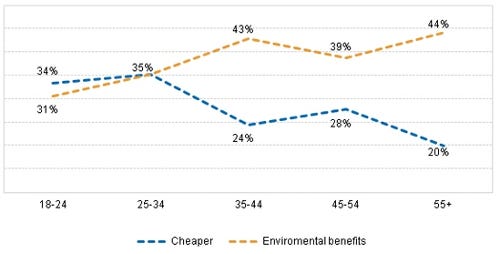'Lighter weight' packaging requires perceptive marketing
January 30, 2014
New research by Canadean Consumer reveals a notable difference in opinion between younger and older consumers in the U.K. when it comes to presumptions about "lighter weight" packaging. The vast majority of consumers are receptive to the idea of buying lighter weight packaging, with only 1 in 10 consumers indicating that they actively "avoid" it. Lighter weight packaging is predominantly attractive to older consumers for environmental benefits. Younger consumers, on the other hand, are less motivated to purchase for environmental reasons and are more conscious of potential cost savings.

U.K. lighter weight pkg study
The packaging industry is evolving, with many FMCG brands choosing smaller, lighter pack formats for a variety of reasons. Although 91 percent of consumers claim to at least occasionally purchase products with "lighter weight" packaging, only 12 percent "actively do so." This enthusiasm for the lighter pack format is more apparent among younger consumers, with 17 percent of 18-24 year olds, and 21 percent of 25-34 year olds indicating that they actively seek products which claim to have "lighter weight" packaging, compared to the national average of just 12 percent. Among the 9 percent of consumers who avoid buying these products, 41 percent do so because they are "sceptical about companies 'greenwashing' for their own benefit."
Interestingly, consumer presumptions towards products with lighter packaging are largely polarised. While 27 percent would buy lighter packaged products mainly because they are "usually easier to carry," there are some notable differences by age when it comes to consumers buying these products for "environmental benefits" (40 percent overall) or because they perceive these products to be "cheaper" (26 percent). The research reveals that older consumers would buy lighter weight products because of the environmental benefits significantly more than younger consumers, who in turn are more inclined to align lighter packaging with cheaper prices.
According to Alex Wilman, research manager at Canadean Consumer: "These results imply that younger consumers appear to be driven more by price consciousness, whereas seniors appear to be more in touch with their environmental side. While many consumers will recognise the environmental benefits of lighter packaging, it seems that younger consumers—perhaps sceptical towards environmentalism—are more likely to expect lighter packaging to come with a cheaper price tag."
Wilman continues: "For manufacturers producing light weight packaging, there are nuances that should be observed depending on target demographics. For products targeted at younger consumers, portraying the 'value-added' message is critical, while stressing the environmentally friendly nature of lighter weight packaging will prove more successful with products targeting older consumers."
Ultimately, while consumers are warm towards the idea of lighter weight packaging, attitudes vary considerably towards the main benefits and pricing implications. In fact, while 56 percent of consumers wouldn't pay any more or any less for lighter weight packaging, 14 percent of consumers would expect to pay up to 20 percent less than the price of the same product with normal packaging, while another 11 percent would expect to pay up to 20 percent more. Wilman concludes: "This polarisation further emphasises the importance of marketing lighter weight packaging in a considered and targeted manner."
Source: Canadean Consumer
.
About the Author(s)
You May Also Like


